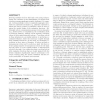284 search results - page 5 / 57 » Evolving interface design for robot search tasks |
ICRA
2008
IEEE
15 years 8 months ago
2008
IEEE
— Consider the task of searching a region for the presence or absence of a target using a team of multiple searchers. This paper formulates this search problem as a sequential pr...
138
Voted
GECCO
2010
Springer
15 years 3 months ago
2010
Springer
Evolving multiple robots so that each robot acting independently can contribute to the maximization of a system level objective presents significant scientific challenges. For e...
115
click to vote
IE
2007
15 years 3 months ago
2007
Unmanned vehicles (UV’s) are increasingly being employed in civil and military domains often for operations in dangerous environments. Typically these vehicles require some leve...
131
click to vote
CONNECTION
2004
15 years 1 months ago
2004
The Artificial Life approach to Evolutionary Robotics is used as a fundamental framework for the development of a modular neural control of autonomous mobile robots. The applied e...
109
click to vote
FUZZIEEE
2007
IEEE
15 years 8 months ago
2007
IEEE
— The type-2 Fuzzy Logic Controller (FLC) has started to emerge as a promising control mechanism for autonomous mobile robots navigating in real world environments. This is becau...

